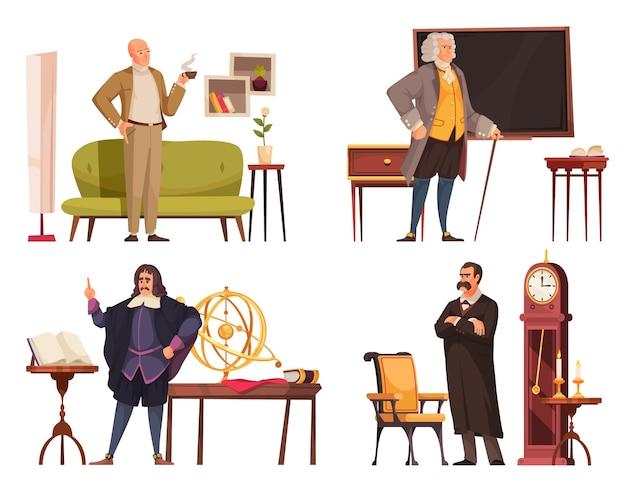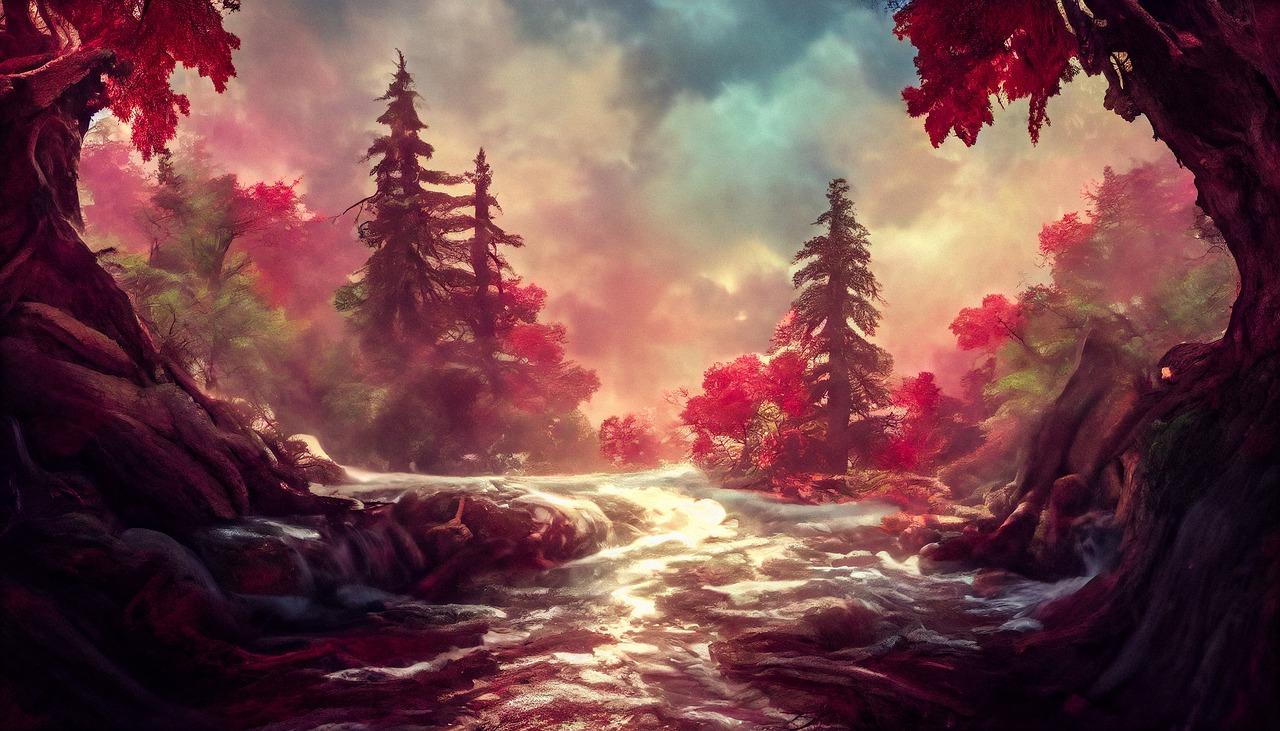In the realm of philosophy, few names shine as brightly as Jean-Jacques Rousseau. Born in 1712, Rousseau left an indelible mark on the intellectual landscape of the 18th century, and his ideas continue to resonate in the modern world. As a leading figure of the Enlightenment, Rousseau’s works challenged conventional wisdom and laid the groundwork for social and political revolutions with his radical ideas on human nature, government, and the social contract.
Have you ever wondered how Rousseau viewed humanity in its natural state? What kind of government did he believe was ideal? And what are the main ideas that make Rousseau’s philosophy so compelling? In this blog post, we will delve into these questions and more, exploring the profound influence Rousseau had on shaping our understanding of society, politics, and equality. So, fasten your intellectual seat belts as we embark on a journey through the mind of one of history’s most influential thinkers!

What are the Main Ideas of Jean-Jacques Rousseau
Jean-Jacques Rousseau was an influential philosopher who lived in the 18th century. His ideas continue to shape political and social discourse even in the present day. In this section, we will explore some of the main ideas put forth by Rousseau, from the concept of the social contract to the importance of education.
The Social Contract: Society and Government
Rousseau’s concept of the social contract asserts that individuals willingly surrender some of their natural freedoms in exchange for a well-organized society. He believed that the needs and desires of the community should take precedence over individual interests. Rousseau argued that a legitimate government arises from a social contract in which individuals agree to be governed in a way that benefits the common good.
Natural Innocence and the Corruption of Society
Rousseau believed that humans are inherently good and free in their natural state. However, he argued that society corrupts individuals by introducing inequality, competition, and materialistic values. According to Rousseau, civilization has led to the uneven distribution of wealth, which fosters conflict and discontent.
General Will and Popular Sovereignty
A central theme in Rousseau’s philosophy is the concept of the general will. He posited that the general will represents the collective interests of the people as a whole, rather than the desires of individual factions or elites. Rousseau believed that true democracy could only be achieved by aligning the government with the general will, ensuring that decisions are made for the benefit of the entire community.
Education and Emile’s Ideal Education
Rousseau’s views on education were revolutionary for his time. He advocated for a more natural and individualized approach that focused on the development of a person’s innate abilities and talents. Rousseau’s book “Emile” provides a detailed account of his vision for education, emphasizing the importance of hands-on learning, moral development, and cultivating curiosity.
Romantic Naturalism and the Noble Savage
Rousseau’s ideas on the “noble savage” and the inherent goodness of humans in a natural state had a profound impact on the romantic movement. He celebrated the simplicity and purity of pre-civilized societies, arguing that they were more harmonious and authentic than modern civilizations. This perspective influenced romantic writers, artists, and thinkers who sought to reconnect with nature and celebrate human emotion.
In conclusion, Jean-Jacques Rousseau’s ideas continue to be relevant and widely discussed today. From the concepts of the social contract and the general will to his views on education and the noble savage, Rousseau’s philosophy offers valuable insights into our current political and social landscape. By exploring these ideas, we can gain a deeper understanding of the complexities of society and the importance of individual freedoms and collective well-being. So next time you ponder the intricacies of government or the nature of human goodness, remember the timeless ideas of Jean-Jacques Rousseau!

FAQ: Explore the Fascinating Ideas of Jean-Jacques Rousseau
How Did Rousseau View Humanity in Its Natural State
Ah, the elusive state of nature! According to Rousseau, in this blissful stage before civilization got its clutches on us, humanity was pure and innocent, just like a freshly baked chocolate chip cookie straight out of the oven. He believed that people in their natural state were free, equal, and guided by their own instincts. It was a time when there were no hierarchies, no rules, and no need for designer clothes. Imagine a world where sweatpants were the height of fashion! Oh, what a dream!
What Type of Government Did Rousseau Advocate
Rousseau had this wacky idea that monarchies and aristocracies were a tad bit outdated. Instead, he favored a system called “direct democracy.” In this delightful utopia of his imagination, all the citizens would get together and make decisions collectively. It’s kind of like a giant potluck dinner where everyone brings their opinions, stirs them together, and voila! You have a decision soup. Yum!
What Are the Prized Ideas of Jean-Jacques Rousseau
Ah, the meat and potatoes of the FAQs! Rousseau had some mind-blowing ideas that rocked the intellectual world. Here are a few of his greatest hits:
-
The Social Contract: Rousseau believed that society and government were based on an unspoken agreement called the social contract. This contract stated that individuals agreed to surrender some of their freedoms in exchange for protection and benefits from the government. It’s like signing up for a gym membership, but instead of abs, you get laws.
-
General Will: Rousseau said that decisions made by a society should be based on the general will – the common good of all its members. It’s like democracy on steroids! So, when you’re voting, don’t think about your Netflix queue; think about what’s best for everyone. Unless what’s best for everyone is a Netflix marathon. Then go for it!
-
Equality: Rousseau was all about equality, baby! He believed that everyone should have the same basic privileges and opportunities. No fancy-pants elites hogging all the cake while the rest of us get crumbs! It’s like a giant game of Pass the Parcel, but instead of a present, we pass around opportunities. Everyone gets a fair chance at unwrapping success. How lovely!
What Do Locke and Rousseau Have in Common
Locke and Rousseau, the dynamic duo of political philosophy! Although they had their differences (like whether pineapple belongs on pizza), they shared some common ground:
-
State of Nature: Both Locke and Rousseau believed in the concept of the state of nature, where people existed before the establishment of organized societies. They both agreed that this state was blissful and freedom-filled. Like living in a never-ending summer vacation, but without the poolside cocktails. Bummer!
-
Social Contract: Another common thread between these two thinkers is the idea of the social contract. They both believed that society is formed through a mutual agreement among individuals, although they had different ideas about how this contract worked and what it involved. It’s like they were playing a game of “Choose Your Own Adventure” with political theory!
Why Is Rousseau’s Social Contract So Important
Rousseau’s social contract has had a profound impact on political and social thought. Here’s why it’s a big deal:
-
Individual Freedom: The social contract recognizes the importance of individual freedom while balancing it with the needs of society as a whole. It’s like ensuring everyone gets a slice of pizza without stealing the last slice from someone else’s plate. Because pizza theft is a serious crime!
-
Legitimacy of Government: Rousseau’s social contract gives governments their authority by basing it on the consent of the governed. It’s like saying, “Hey, government, you can only boss us around if we say it’s okay!” It’s democracy’s way of making sure no one gets stuck with a ruler who thinks they’re the reincarnation of Julius Caesar. Beware the delusions of grandeur!
How Did Philosophers Spread Knowledge in the Olden Days
Ah, the good old days when philosophers weren’t just sitting in their ivory towers, making vague hand gestures and perplexing facial expressions. Back in the day, philosophers spread knowledge through various means:
-
Written Works: Philosophers like Rousseau wrote books and treatises to convey their ideas. It was like the original long-form content! They didn’t need to worry about character limits or hashtags. Lucky them!
-
Salons: Philosophical salons were a fancy way for intellectuals to gather, exchange ideas, and debate. Kind of like a book club, but with more powdered wigs and elaborate prose. It was a place where smart people could mingle and have riveting conversations that made everyone else feel woefully inadequate. Fascinating stuff!
How Did Rousseau Impact the World
Oh, Rousseau, you wild and influential thinker! He made quite the splash in his heyday and left a lasting impact. Here’s how he shook up the world:
-
Education Reforms: Rousseau’s ideas on education were revolutionary. He believed in a more individualized approach, tailoring education to each child’s needs. It’s like personalized learning plans before they were cool! He also emphasized the importance of hands-on experiences and learning through play. Dear school system, take notes!
-
Democratic Movements: Rousseau’s ideas about democracy and the importance of the general will influenced later democratic movements. His concepts of popular sovereignty and individual rights echoed throughout revolutions like the French and American Revolutions, inspiring people to demand their right to life, liberty, and the pursuit of happiness. Talk about leaving a legacy!
What According to Rousseau Is the Root Cause of Inequality
According to Rousseau, inequality ain’t no accident; it’s all about the bling! He believed that inequality stemmed from private property and the division of labor. The moment someone claimed something as “mine” and started hoarding it, inequality raised its ugly head. It’s like the neighborhood rat that sneaks into your picnic and steals all the potato salad. Greedy little buggers!
So there you have it, a whirlwind tour through the captivating ideas of Jean-Jacques Rousseau! Hope you enjoyed this FAQ session and came away feeling both informed and entertained. Now, go forth and impress your friends with your newfound Rousseau knowledge. Just remember, no potato salad theft allowed!
